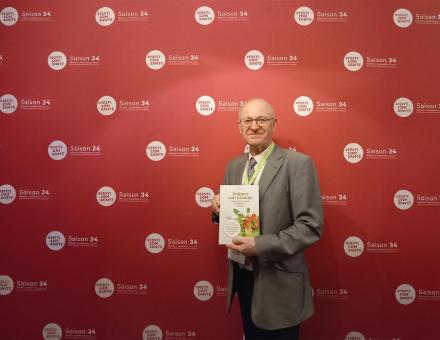Whether at school, at work, or in our leisure activities, we interact with individuals from diverse cultural backgrounds. “Cultural intelligence,” which enables us to understand and adapt to different cultural codes, is an essential asset for promoting harmonious coexistence.
What does it mean to be intelligent? Passing a logic test? Solving an equation? Having a good memory? Intelligence has long been reduced to an IQ score. However, as early as the 1920s and 1940s, American psychologists such as Edward Thorndike, Louis Thurstone, and Raymond Cattell were already emphasizing the existence of different forms of intelligence.
In the 1980s, another American psychologist, Robert Sternberg, proposed an approach that distinguishes three complementary dimensions: analytical intelligence (reasoning, comparing, problem solving), creative intelligence (imagining, coping with novelty), and practical intelligence (adapting to one's environment, acting effectively). According to his approach, being intelligent means above all knowing how to achieve one's life goals in a given context by mobilizing one's strengths and compensating for one's weaknesses.
Interacting in multicultural environments
The concept of cultural intelligence (CQ) emerged as a continuation of Sternberg's work. Proposed by Earley and Ang in 2003, it refers to the ability to understand cultural differences, adapt to them, and interact effectively in multicultural environments. The initial goal was to explain why some expatriates are more successful than others in international assignments. The researchers identified four complementary dimensions of cultural intelligence.
The metacognitive dimension corresponds to the ability to be aware of one's own cultural biases and to adjust one's way of thinking and interacting according to the context. For example, a French manager may be accustomed to expressing criticism in a very direct manner. When dealing with people from a cultural background where criticism is expressed more implicitly, they understand that this style may be perceived as too abrupt. They then review their approach to facilitate cooperation.
The cognitive dimension refers to general knowledge about other cultures, their norms, and practices: knowing, for example, that in Japan, exchanging business cards follows a specific ritual, that in Germany, any delay is perceived as a real lack of respect, or that in the United States, small talk during a meeting is an essential step before getting down to business.
The motivational dimension reflects the desire and confidence needed to interact with people from different cultures. This can be seen, for example, in students who voluntarily choose to join an international team even though it will require more effort to communicate.
Finally, the behavioral dimension refers to the ability to adapt one's verbal and nonverbal behaviors in an intercultural interaction. This may involve slowing down one's speech, modulating one's tone of voice, or adjusting the distance between oneself and the other person, depending on the cultural context.
An essential skill
Numerous studies confirm the positive effects of cultural intelligence. For example, it helps expatriates adapt better and reduces their anxiety, improves leadership and performance in multicultural teams, and stimulates cooperation and innovation by facilitating knowledge sharing.
Initially designed to support executives on assignment abroad, cultural intelligence is now recognized as an essential skill in many contexts: at work, at school, but also in everyday life, wherever people from different cultures interact.
Research also shows that this skill can be learned and developed. Intercultural training, whether in the form of courses, role-playing or simulations, helps people to better understand cultural differences. That said, immersive experiences are proving to be the most effective: projects in multicultural teams or stays abroad have a lasting impact on cultural intelligence.
What a study of engineering students reveals
Cultural intelligence is relevant to the vast majority of students, who are called upon to learn and work in multicultural environments. With this in mind, we conducted a study of engineering students participating in international mobility programs to understand how this experience could strengthen their cultural intelligence.
Specifically, we assessed their cultural intelligence using a scientifically recognized questionnaire administered twice: before their departure and upon their return from mobility. This longitudinal methodology allows us to compare initial and final levels and measure the evolution of the different dimensions of cultural intelligence.
The results are clear: international mobility significantly improves cultural intelligence, especially among those who had traveled little before or who were not spontaneously open to other cultures. In other words, the more “novice” you are, the more you progress. This is what we call “the first-time effect”: during a first prolonged contact with another culture, everyone is led to revise their reference points.
These results have direct implications for the training of engineering students. International mobility is not only an asset to highlight on a resume: it is a unique opportunity to develop cross-disciplinary skills that are now essential in the world of work. Employers expect their employees to be not only technically competent, but also able to adapt to multicultural environments and cooperate effectively across borders.
Our findings are consistent with other research showing that cultural intelligence goes far beyond the scope of stays abroad. It promotes peaceful coexistence by reducing prejudice, helps people cooperate better at work or in their studies, and ultimately prepares everyone to thrive in international environments. Schools and universities play a key role: by developing these skills, they help to train more adaptable professionals, but also to build a more inclusive society.
This article is published as part of the Fête de la science (Science Festival), which takes place from October 3 to 13, 2025, and of which The Conversation France is a partner. This new edition focuses on the theme of “Intelligence(s)”. Find all the events in your region on the website Fetedelascience.fr.
Marie Chédru, Lecturer and Researcher, Humanities and Social Sciences, UniLaSalle and Mariia Ostapchuk, Lecturer and Researcher in Management Sciences, UniLaSalle
This article is republished from The Conversation under a Creative Commons license. Read the original article.






